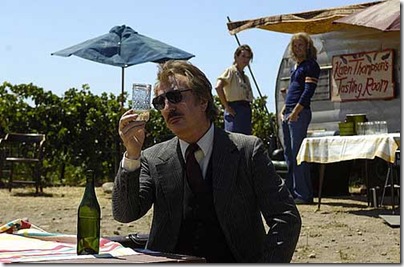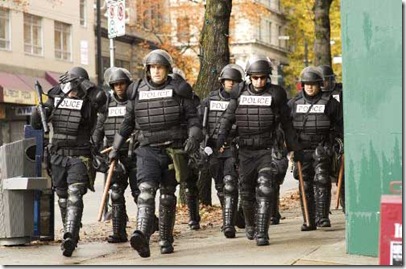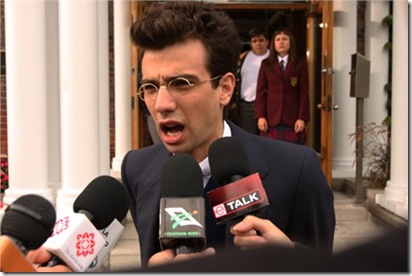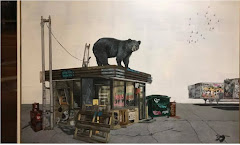One night about a year ago, I fished the remainder bin at my local Blockbuster and came up with two films I’d meant to see but hadn’t --- “Bottle Shock” and “Battle in Seattle”.
I ended up liking both --- a lot, recommending them to biz associates in the “This is the kind of stuff we should be making” conversations I get into from time to time.
I even wrote a post intended to encourage you to check them out, stuck it on my sidebar and promptly forgot about it.
A week ago, I found that post and was about to dump it when I realized there was a lesson in those movies that might address an increasing concern.
We’re going through a rough patch in English Canada when it comes to getting people to watch the films and TV we make.
The TV bar seldom rises above a million viewers. And we lose the opportunity to ignite new interest because too much broadcast shelf space is taken up by repeats or series that would normally be axed by any industry based on ratings but which get renewed here mostly because the network needs to amortize its investment over a second or third season.
On our movie screens, the situation is worse.
While it makes sense that a film like “Gunless” would fail to find an audience and collapse under its own mediocrity, it’s tough to understand why a singularly original piece like “The Trotsky”, blessed by positive reviews, a spectacular trailer and lots of online heat would attract only paltry handfuls of paying customers at an embarrassingly small number of cinemas.
Part of the trouble “The Trotsky” is having in finding an audience is that it’s a fairly highbrow high concept (a high school kid who thinks he’s the reincarnation of Leon Trotsky).
Nothing wrong with that creatively. But the film is also being sold as home-grown product in an industry that has made a point of repeatedly reminding Canadians how meaningful and important everything it releases is.
This ignores the reality that “meaningful” and “important” are verdicts rendered by the audience. They decide if a movie is those things or if it’s art and especially if it’s worth parting with ten bucks or more to experience in the first place.
Whatever intent might reside in the hearts of a film’s creators, distributors or a well-meaning government bureaucrat means nothing in the final analysis.
The audience always decides.
But, unfortunately, the Canadian film industry has followed a “Top Down” approach to production and marketing for a long time now, following the Family Compact tradition of knowing what’s best to maintain peace, order and good government among we hewers of wood and carriers of water.
We’re also a society that has been taught to endlessly seek affirmation and approval. And if that can’t be found from outside, its provided to us from above.
So people in the government's employ here have become our “deciders”, doing so through various forms of bureaucratic activity be it funding allocation, regional needs or prevailing government sentiment with regard to what’s best for us to embrace; continually reminding us on a film’s release that its content is elevating, earnestly reflects our best traits or has been acknowledged by international festival juries.
Unlike countries whose successful entertainment industries built themselves from what the local audience would eagerly pay for and then kept challenging them (the way artists do) to expand their tastes and interests; we took an elitist approach and ended up alienating the very people we most need in order to succeed.
Therefore, when “The Trotsky” comes along, it not only has to deal with the inevitable “Who’s Trotsky again?” “I never heard of the Russian revolution, so will I get the jokes?” questions; it is also saddled with differentiating itself from Canadian “comedies” that came before and bored the asses off the people now scanning the multiplex marquee for something to entertain them.
There’s probably no better example of this process than the way we approach historical drama. Almost everything in that genre made here is also “Top Down” concentrating on our political notables and their achievements, “Trudeau”, “Rene Levesque”, “Tommy Douglas: Prairie Giant”, “Elijah”.
No soul shattering “Hotel Rwanda” version of some African massacre for us either. We might “Shake Hands With The Devil” but we have our side represented by a General and keep the encounter clinical and politically correct, avoiding universal truths in order to make sure blame is properly assigned.
SPOILER ALERT: None of it was our guy’s fault despite what a lot of Belgians might tell you.
We also hardly ever look at our history from the point of view of the people who had their lives impacted by such as those listed above, even though its those people who comprise the audience we’re endeavoring to reach.
We have rarely examined our wars through the eyes of ordinary fighting men. No “Band of Brothers” or “The Pacific” or even an "In Which We Serve" or "The Cruel Sea", in the process establishing a distance between what so many experienced but has yet to be dramatized and made relatable to their children and grandchildren.
And as anybody who has written historical drama or even a biopic will tell you, the secret to finding an audience is making the story and characters resonate with contemporary lives.
“Spartacus: Blood and Sand” may be a pot-boiler combination of video game violence, hot sex and B-movie dialogue. But so far, it has stayed true to the historical record. Crixus, Batiatus and Oenomaus --- all real people. The brilliance of the writing and production is that it fills in the gaps in our recorded knowledge with material a modern audience will happily embrace.
The series' success has led to books about Spartacus flying off library and bookstore shelves all over the world. There may be a few readers wondering what happened to the part where Spartacus bangs Ilithyia, but just as many are realizing the corrupt and declining Roman Empire offers insights into our own time.
Likewise, you can’t watch the final episode of “The Pacific” in which the fighting men come home without seeing direct comparisons to warriors returning from Afghanistan or Iraq and gaining greater understanding into how difficult the transition from combat can be for all concerned.
There is no reason Canadian films couldn’t be connecting with Canadian audiences in the same way. Which brings me back to “Bottle Shock” and “Battle in Seattle”.
Both films were made for budgets of $8 Million – about 20% more than “The Trotsky” and 20% less than “Gunless”. So they are not beyond our production norm.
Both deal with events of less than minor importance in the march of history but which remain moments that altered the way we view the world.
“Bottle Shock” is about how the world discovered California wines.
It's a feel-good underdog story told with immense charm and an endearing mood of innocence. Beautifully shot and featuring a bravura performance by Alan Rickman, the cast includes Bill Pullman, Chris Pine, Rachael Taylor, Freddy Rodriguez, Eliza Dushku and Dennis Farina. No doubt all of them enticed by a fine script by Jody Savin, (director) Randall Miller and Ross Schwartz which includes one of my favorite lines about culture -- "You're a snob. It limits you."
Here's a taste…
"Bottle Shock" is both historically accurate and unapologetically fun. It doesn't try to say it is important or meaningful. Its message is simply, "This happened and we think you'd enjoy hearing about it -- perhaps while enjoying a crisp Chardonnay."
I also guarantee that when its over you'll seek out a bottle of Chateau Montelena ($3 a bottle in 1976 and $170 today).
See what a little enjoyable movie PR might do for a non-cultural industry?
And you wouldn't have to look too far to find an almost identical Canadian story just waiting to be told. Mere months ago, a Quebec cheese beat all of its French competitors to be named the best cheese in the world.
I see Don McKellar in the role of a man who knows cheese with the guys from "Les Boys" as Gaspe Dairy farmers and perhaps Pamela Anderson or Kim Cattrall as winsome milkmaids…
Who knows, maybe there's a Quebecois scynariste at work on the project right now. And I hope that's true, because once again, there's little likelihood our "Top Down" regionally fractured subsidy system would support such a project submitted from elsewhere.
That's because our "the only way you can get anything made is with government money" system also forces the bureaucrat green-lighting a historical piece to make sure questions aren't raised about why nobody is making a film about Ontario cheese, Okanagan wines or the Italian discovery that the best pasta flour came from Saskatchewan.
It's always safer for those guys to just stick with politicians. Even if nobody West of Manitoba will bother with a movie about Trudeau and nobody East of it will endure one about Diefenbaker at least you can cover your butt by regurgitating what every Canadian kid has to learn in school anyway.
Like it or not, the unspoken reality of state funded art is that you can't keep politics out of the decision making.
And that means a film like "Battle in Seattle" is unlikely to get any Public funding in Canada. More's the pity too, because this is one of the best films you'll see to gain an understanding of what International Trade Agreements, Corporate Globalism and acronyms like "WTO" and "IMF" mean to all of us.
Written and directed by actor Stuart Townsend, the film takes you into the lives of politicians, anarchists and ordinary people with views from all parts of the political spectrum or no ideological position at all as they confront each other on the streets of Seattle.
Mostly shot on the streets of Vancouver with a Canadian crew, the film is filled with taut drama and chaotic action from stars Martin Henderson, Charlize Theron, Woody Harrelson, Connie Nielsen, Andre Benjamin, Michelle Rodriguez and Ray Liotta; with a gem of a performance by Rade Serbedzija as a doctor begging for AIDS drugs for Africa.
The film's trailer perfectly captures its mood…
That final phrase "The Whole World's Watching" was first chanted on the streets of Chicago in 1968 (coincidentally the 2nd time in my life when I was tear gassed). And it provides a clue to how the same kind of film might be possible here.
Also on the streets of Chicago that night was a cinematographer named Haskell Wexler, who filmed much of the riot as well as the pitched daylight battle between police and protestors in Grant Park.
He took his footage and built a film around it called "Medium Cool" shot on the same locations in Chicago a year later with actors Robert Forster and Verna Bloom filling in the drama interspersed with the riot footage.
We copied this concept during the first season of "Adderly", sending a camera guy to shoot "B" roll of some political summit and ending up with spectacular footage of riot cops, slinky limos and flag festooned avenues, into which we inserted our fictional spies and a concocted international intrigue.
It gave us a level of production far beyond our budget yet cost next to nothing. And the same opportunity, only on a much larger scale, awaits somebody willing to do the same during the G20 Conference in Toronto at the end of June.
Shoot what you can. Add a story later. While the bureaucrats at the CMF will be loathe to come near you, you might have enough to get a private investor to take a chance.
Both "Bottle Shock" and "Battle in Seattle" illustrate ways we might be able to get around the bureaucracies choking off our connection with audiences and lure them back into our theatres.
They also illustrate that our audiences aren't getting anywhere near their money's worth from Canadian films of comparable budget.
How does either film offer an array of marquee names while "Gunless" costs more and stars Paul Gross and virtually nobody else you've heard of?
How does one film recreate the 1970's in both Napa Valley and Paris while the other offers relentless action, yet both cost less than a Canadian one which, while in an easier to replicate period relies on one set and crams all of its action into the final 10 minutes?
Those are things we need to look into as well, but which we can't since Telefilm never tells when questioned on how taxpayer money was spent.
Getting those bureaucratic mentalities out of our industry is the first step to making our audience realize we're just like them and not somebody else from the government trumpeting what's good for them while charging for what they already paid for.
But until we solve those problems --- Go see "The Trotsky" and take along as many friends as you can. They won't be disappointed and none of you will have any trouble finding a seat.








3 comments:
An awful lot in that post, Jim.
And some of it is deja vu all over again. I have to admit, when I saw the ads for The Trotsky it reminded me of a lot of talk I heard, what thirty years ago (?) when Gregory's Girl came out - why don't we make movies like that in Canada?
Thanks for posting. :)
I managed to track down Bottle Shock, great film! I really enjoyed it.
I hope the others are available in region 2. No sign of them on my initial search. Must look harder....
"We also hardly ever look at our history from the point of view of the people who had their lives impacted ...We have rarely examined our wars through the eyes of ordinary fighting men...in the process establishing a distance between what so many experienced but has yet to be dramatized and made relatable to their children and grandchildren."...I laughed when I read this part. This is exactly what Paul Gross did with "Passchendaele". Clearly it wasn't your cup of tea, but a lot of people enjoyed it, including me. I liked "Gunless" too. I found it very much in the same vein as "Local Hero" and the other charming and gentle comedies that Bill Forsyth made in the 80's (including "Gregory's Girl" as mentioned in an earlier comment). You make some good points, but I can't help thinking I'm hearing sour grapes when it comes to the handful of Canadian actors/producers who have managed to be successful.
Post a Comment